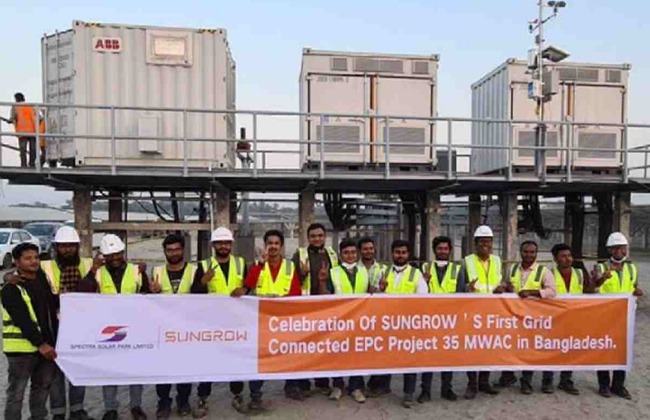
A 35MW solar power plant in Manikganj has gone into commercial operation supplying electricity to the national grid.
“The plant has been supplying electricity to the national grid since it started its commercial operation in March this year,” said Imran Chowdhury, country head of the Sungrow Power Supply Company Ltd, which worked for the project as engineering, procurement and construction (EPC) contractor.
Spectra Solar Park Ltd, (SSPL), a joint venture of Bangladeshi Spectra Group and Chinese Shunfeng Investments Limited (SIL), developed the project at Shibalaya Upazila in Manikganj with $15 million financial support from the Asian Development Bank (ADB).
The state-owned Bangladesh Power Development Board (BPDB) will purchase electricity from this independent power producer (IPP) project at a rate of TK 11.12/kWh ($0.13) under a 20-year power purchase agreement (PPA).
Official sources said SSPL is a special purpose vehicle (SPV) owned by Bangladesh-based Spectra Engineers Limited (SEL) and the Hong Kong, China-based Shunfeng Investments Limited (SIL).
The SSPL is the borrower for the loan and will build, own, and operate the project. SEL owns 80 percent of SSPL and SIL owns the remaining 20 percent.
According to the sources, the Consortium of Spectra Engineers Limited & Shunfeng Investment Limited owned the 35 MW (AC) grid-connected solar park through an unsolicited offer under the Fast Power and Energy Supply (special) Act.
They said this has been the 4th IPP project that came into operation although more than 20 such projects were awarded to private sponsors.
Earlier, 4 IPP projects — 50 MW (AC) Solar Park Gauripur, Mymensingh by HETAT-DITROLIC-IFDC Solar Consortium, 8 MW Solar Park in Panchagarh by Parasol Energy Ltd., 20MW (AC) Solar Park Teknaf Upazila, Cox’s Bazar by Joules Power Limited (JPL) and 3 MW Grid-connected PV Power Plant at Sharishabari in Jamalpur by Engreen Sharishabari Solar Plant Ltd, owned by IFE-CPC-JEL Consortium — went into operation.
Imran Chowdhury said the Chinese mother company has launched Sungrow Renewable Energy Bangladesh Limited (SREBL) as a new company to work as IPP project developer beyond its current job of EPC contractor to make a significant contribution to National Solar Energy Roadmap Up To 2041.
He said Sungrow now offers different technologies and solutions — solar-plus energy storage solution (ESS), power plant by lithium-ion battery, floating solar power plant, solar fishery power plant, ground-mounted solar power plant — for the Bangladesh market.
The study, titled ‘National Solar Energy Action Plan 2021-2041’, was conducted by the Sustainable and Renewable Energy Development Authority (Sreda) in collaboration with the United Nations Development Programme (UNDP).
Meanwhile, the country’s Power System Master PLan (PSMP) has set a target to reach the renewable energy’s share to 10 percent of total power generation capacity (2470 MW) by 2021 — a major focus was supposed to be on exploiting the potential of solar energy to achieve the goal.
But available data shows the country now has the generation capacity of 20,595 MW from conventional sources while power from renewable sources is lagging far behind at 700.61 MW, which is around 3 percent of the total generation capacity.
The Sustainable and Renewable Energy Development Authority (Sreda) show that among different renewable energy sources, PV solar leads the sector with 466.68 MW generation capacity, while it is followed by hydro with 230 MW capacity, 2.9 MW from wind, 0.63 MW from Bio-gas and 0.4 MW from Biomass.
Energy experts say that Bangladesh is far behind Pakistan and India, among its South Asian neighbors, in utilising renewable energy resources for electricity generation.
The PSMP stipulates for 35 percent power generation from imported LNG (liquefied natural gas), some 35 percent from imported coal, 15 percent from renewable energy, 10 percent from nuclear energy and five percent from petroleum oil by 2041, when the country’s generation will reach 60,000 MW, the officials added.

